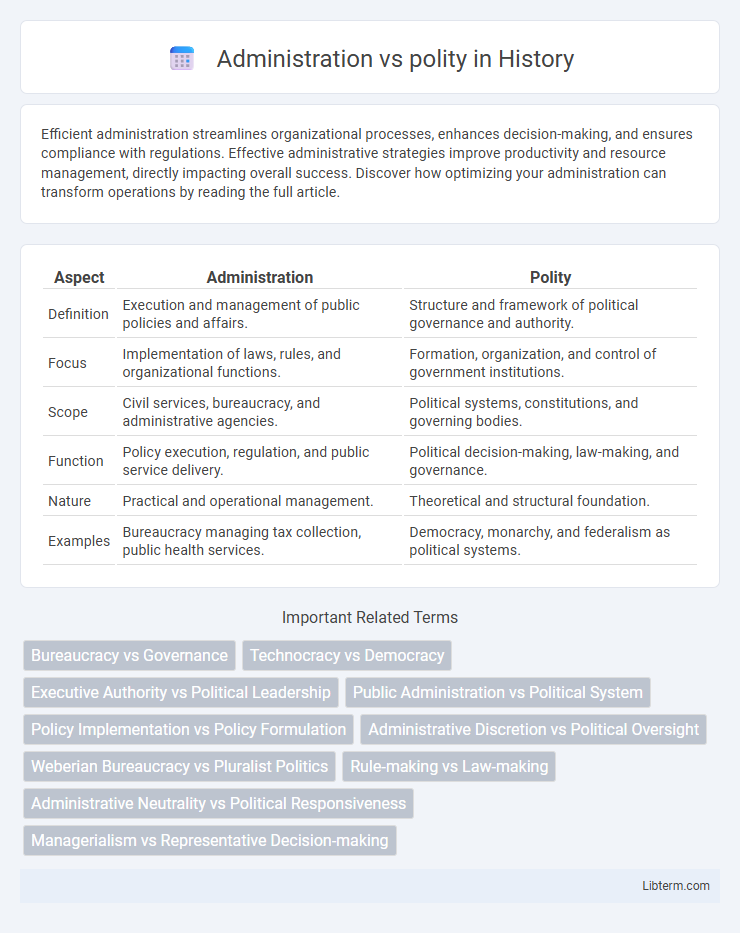Efficient administration streamlines organizational processes, enhances decision-making, and ensures compliance with regulations. Effective administrative strategies improve productivity and resource management, directly impacting overall success. Discover how optimizing your administration can transform operations by reading the full article.
Table of Comparison
| Aspect | Administration | Polity |
|---|---|---|
| Definition | Execution and management of public policies and affairs. | Structure and framework of political governance and authority. |
| Focus | Implementation of laws, rules, and organizational functions. | Formation, organization, and control of government institutions. |
| Scope | Civil services, bureaucracy, and administrative agencies. | Political systems, constitutions, and governing bodies. |
| Function | Policy execution, regulation, and public service delivery. | Political decision-making, law-making, and governance. |
| Nature | Practical and operational management. | Theoretical and structural foundation. |
| Examples | Bureaucracy managing tax collection, public health services. | Democracy, monarchy, and federalism as political systems. |
Definition of Administration and Polity
Administration refers to the process of organizing and managing resources, policies, and personnel to implement government laws and programs effectively. Polity denotes the structured system or form of government within which political authority is exercised, encompassing institutions, laws, and governance frameworks. Understanding the distinction helps clarify that administration focuses on execution and management, while polity defines the political organization and legal structure of a society.
Historical Evolution of Administration and Polity
The historical evolution of administration and polity reveals a gradual shift from tribal and monarchic governance structures to complex bureaucratic states characterized by codified laws and institutional frameworks. Early administrative systems focused on centralized control and resource management, while polis-based political entities emphasized civic participation and legal order, laying the foundation for modern statecraft. This transition highlights the interplay between administrative efficiency and political legitimacy, shaping contemporary public administration theories and practices.
Key Differences Between Administration and Polity
Administration refers to the execution and management of public policies, focusing on organizational processes and resource allocation, while polity encompasses the structure, principles, and systems of governance within a political community. Administration operates within the framework established by polity, implementing laws and decisions made by political authorities. Key differences include administration's emphasis on efficiency and practical governance, contrasted with polity's concern for authority, legitimacy, and the overall political organization of society.
Core Functions of Administration
Administration centers on implementing policies through resource management, organizational coordination, and service delivery, ensuring efficient public sector operations. Core functions include planning, organizing, staffing, directing, and controlling to achieve governmental objectives effectively. Unlike polity, which focuses on the political framework and power dynamics, administration emphasizes operational execution and procedural management in governance.
Core Functions of Polity
Polity primarily focuses on establishing the framework for governance, encompassing the formulation of laws, policies, and the allocation of political authority to maintain social order. Core functions of polity include the legitimization of power, conflict resolution through political processes, and ensuring representation of diverse societal interests. Administration, in contrast, concentrates on the implementation and management of these policies and laws within the structures established by the polity.
Relationship Between Administration and Polity
The relationship between administration and polity is integral, with administration implementing the policies formulated by the polity, which consists of the political leadership and institutions. Administration acts as the operational arm ensuring effective execution of political decisions, thereby bridging policy-making and practical governance. This dynamic interaction emphasizes the dependency of political authority on administrative expertise to achieve governance goals.
Impact of Administration on Governance
Administration significantly shapes governance by implementing policies that ensure effective public service delivery and maintain social order. Efficient administrative systems enhance transparency, accountability, and responsiveness, thereby strengthening trust between the government and citizens. Conversely, poor administration can lead to corruption, inefficiency, and weakened institutions, negatively affecting political stability and development outcomes.
Role of Polity in Decision-Making
Polity shapes decision-making by establishing the framework of political institutions, laws, and power relations that guide collective choices and policy directions. It influences the distribution of authority, legitimacy, and accountability, thereby determining which actors participate and whose interests are prioritized in governance. Effective polity ensures inclusive representation and sets the normative principles within which administrative decisions are made and implemented.
Challenges in Harmonizing Administration and Polity
Harmonizing administration and polity faces challenges like bureaucratic inertia, where rigid administrative structures resist political directives aimed at reform. Conflicting priorities arise as political leaders pursue short-term goals while administrators focus on long-term policy implementation. Transparency and accountability gaps further complicate coordination, undermining effective governance and public trust.
Future Trends in Administration and Polity
Future trends in administration emphasize digital transformation, AI integration, and data-driven decision-making to enhance government efficiency and transparency. Emerging political structures reflect a shift towards decentralized governance, increased citizen participation, and the rise of regulatory frameworks addressing global challenges like climate change. Technological innovation and evolving public expectations will continue to reshape the interplay between administration and polity, demanding adaptive governance models.
Administration Infographic

 libterm.com
libterm.com